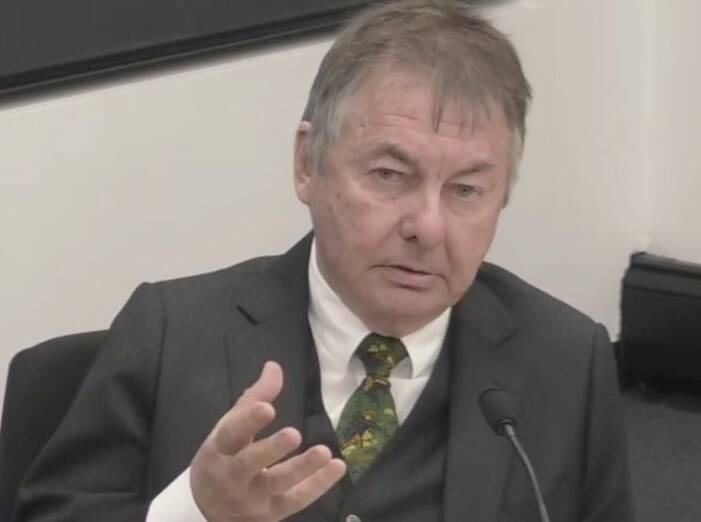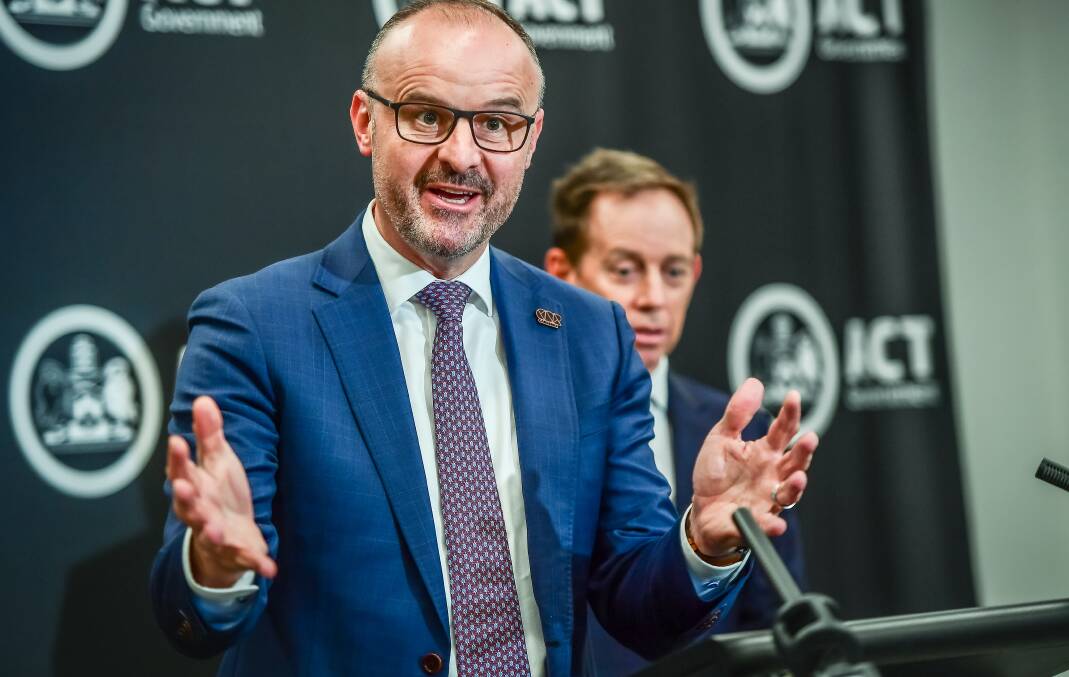Revelations the chair of the inquiry into the botched trial of Bruce Lehrmann used a personal email address have raised concerns over whether the probe handed all required documents to the ACT.
Walter Sofronoff KC used his own email address to respond to the inquiry's secretariat, documents released to The Canberra Times show.
No documents held by the territory show how the inquiry or Mr Sofronoff provided a copy of the report to journalists, while documents are also apparently missing from those released under freedom of information laws.
An ACT government spokeswoman said it was up to Mr Sofronoff to confirm he met legal requirements to hand over all documents created as part of the inquiry.
The identification and discovery of the documents was subject to court proceedings, the spokeswoman said. She declined to comment when asked if the government could be sure all documents had been handed back.
Chief Minister Andrew Barr's directorate is "safekeeping" more than 180,000 documents from the inquiry, the Supreme Court heard last month.
The Canberra Times sought correspondence between the board of inquiry, its chair and staff, and media outlets under freedom of information laws, along with material produced by the board and its staff discussing media strategy, plans, journalists or media outlets.

The Canberra Times suggests no wrongdoing on the part of Mr Sofronoff. Mr Sofronoff did not respond to questions.
An ACT government spokeswoman said: "Material provided by the board of inquiry, that covered all of the proceedings, was required to be handed over to Chief Minister Treasury and Economic Development Directorate (CMTEDD) for record-keeping. It is up to Mr Sofronoff to confirm that he met all requirements under the act."
The documents released under freedom of information failed to include a response sent to former Canberra Times editor Jack Waterford, who wrote to the inquiry to say it had not been transparent.
Waterford received a response from the inquiry's executive director, Helen Banks, which was not included in the documents provided to The Canberra Times.
"The chair of the board of inquiry has a statutory duty to conduct his inquiry fairly. In his opinion he has done so. Any person affected by an unfairness is at liberty to raise the matter before the inquiry and, if necessary, before the Supreme Court which has the power to grant a remedy in such cases. No witness has done so," the response, previously quoted by Wateford in a Canberra Times column, said.
The Canberra Times has sought clarification from the Chief Minister, Treasury and Economic Development Directorate freedom of information team about why the response was not included in the documents released.
Documents also show Mr Sofronoff intervened to ensure no comment was made to news.com.au's Samantha Maiden, who asked the board of inquiry about "constant leaking" of information from Ms Higgins' phone and an audio tape of Ten's Lisa Wilkinson speaking to Ms Higgins.
"I want to know if the board of inquiry had access to it and if so has it taken any steps to ensure it was kept secure and how many people had access to it?" Maiden asked.

Maiden also asked the inquiry whether it had any concerns "about material being handed over by a rape complainant being repurposed in this way".
Heavily redacted internal correspondence confirmed the board of inquiry had access to Ms Higgins' text messages, some of which had been shown to parties subject to a non-publication order.
Mr Sofronoff intervened, writing from his personal email address to overrule the issuing of a nine-line response. He instead directed Ms Banks to make no comment.
Lawyers for the ABC asked the board of inquiry whether it had access to material that was leaked about one of its top political reporters.
Text messages sent between journalist Laura Tingle and Brittany Higgins, whose rape complaint against a former colleague at Parliament House was the subject of an aborted 2022 trial that prompted the inquiry, were subpoenaed in June 2022 and later published by the Daily Mail on May 28, 2023.
The corporation's lawyers called on the board of inquiry to confirm whether it had access to the text messages. No response to the ABC's letter was included in documents released under freedom of information.
Mr Sofronoff had sought to find out from Mr Barr's office on Thursday, July 27 when Mr Barr was likely to release the report, and was told no decision had been taken and it would be likely based on the recommendations.
On Sunday, July 30, Mr Sofronoff provided a copy of the board of inquiry report to Janet Albrechtsen, a columnist at The Australian. Mr Barr received the report the following day.
The head of the ACT public service sent Mr Barr a text message at 8.28am on Wednesday, August 2 to warn the Chief Minister that Mr Sofronoff had "apparently" given embargoed copies of the draft report to some journalists, including Albrechtsen.
"Hmmm. That seems improper," Mr Barr sent in a reply text message. Mr Barr's chief of staff wrote to Ms Leigh: "That's... astounding", "What was he [Mr Sofronoff] thinking" and "he never mentioned to CM".
Ms Leigh wrote to Mr Barr's chief of staff to say Ms Banks confirmed Mr Sofronoff "definitely did not give Samantha Maiden information about the draft but it was obvious that someone had. He will contact Janet Albrechtsen and [ABC journalist] Elizabeth Byrne about the redaction".
Maiden published a story on the afternoon of August 2 about the findings of the report, citing sources familiar with its contents. The Australian published an extensive story quoting from the report later that night.
No unredacted documents provided to The Canberra Times show Mr Sofronoff providing the report to Albrechtsen or to the ABC.
Territory Records director Danielle Wickman wrote to Mr Barr's office and Ms Bank on July 5 to provide advice on the management of records and equipment once handed back.
"As a general observation, these things are often easier if the inquiry has access to some advice at its establishment about how to think about its records requirements so that we can make the transfer process more seamless at the end," Ms Wickman wrote.
"If we can somehow build that into future processes for standing up inquiries that would be awesome, and if it has already been done for this one then it should be fairly straightforward."
Mr Sofronoff's inquiry made damning findings about the ACT's former director of public prosecutions, Shane Drumgold SC, who subsequently resigned. The ACT government agreed - or agreed in principle - with its 10 recommendations.
Mr Barr and Attorney-General Shane Rattenbury said the government maintained confidence in the findings despite being "extremely disappointed" by Mr Sofronoff's decision to provide the report to journalists.







